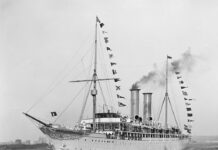On December 9, American Airlines sealed its merger with US Airways, amassing the largest airline in both the United States and in the world. At the time, much of the local conversation surrounding the merger centered on the economic impact the new American, headquartered at Dallas/Ft. Worth International Airport, would have on the Dallas metroplex.
However, a lesser known facet of the merger also mandated that American divest several gates and slots at airports around the country, including two gates at Dallas Love Field. Though American doesn’t offer service to the airport, it leases these gates to Delta Airlines, which flies to Atlanta from Love Field. Delta currently skirts the need to first stop at an airport within the state of Texas or an airport next to the state by flying small regional jets with fewer than fifty-six seats.
However, the expiration of the Wright Amendment and its restrictions this October places a premium on these two gates. The airline that wins use of the gates will gain the ability to serve any destination it wishes within the United States. And while Southwest Airlines already dominates Love Field, controlling eighty percent of its gates, the DOJ should authorize the sale of two more gates to Southwest instead of other competitors, which include Delta and Virgin America.
Southwest’s already strong presence at Love Field begs the question: why does Southwest need more space?
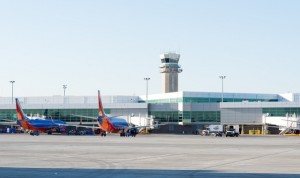
The agreement reached in 2006 for the partial repeal of the Wright Amendment, while allowing the freedom to fly from coast-to-coast, continues to impose limitations on Love Field and the number of gates it may have, restricted to just twenty. So while Southwest controls the majority of these, this leaves the airline with only sixteen total gates, paltry compared to the number American possesses at DFW, where it practically controls three entire terminals, as well as part of a fourth. To truly temper American’s dominance in Dallas, serving as a viable competitor to American, Southwest needs every gate possible.
The addition of two more gates could allow Southwest to offer twenty additional daily flights, approximately ten per gate. Boeing 737’s, which range from 143 seats to 175 seats per plane, would fly these routes, opening anywhere from 2,574 to 3,150 additional seats daily from Love Field, estimates Terry Maxon of the Dallas Morning News. These seats, unlike those offered by either Delta or Virgin America, the most prominent competitors at this point (though others may elect to enter the fray), would represent head-to-head competition with the behemoth American Airlines, as Southwest could use them to expand the list of fifteen cities it will begin offering direct service to in October and November.

Recently, Southwest revealed fifteen new destinations to receive direct service from Love Field once the Wright Amendment officially expires: Baltimore, Las Vegas, Denver, Orlando, Chicago, Phoenix, New York, Atlanta, Los Angeles, Tampa, Ft. Lauderdale, Nashville, San Diego, Orange County, and Washington D.C. With twenty additional daily flights, Southwest would add to this list; on March 10, Southwest committed to, if awarded the gates, augment this initial list by adding seventeen additional non-stop destinations from Love Field, twelve in late 2014 and five in early 2015. This means more direct flights–many more than the five cities Virgin America and six cities Delta promise to serve directly–for Dallas-area residents, who are currently forced to turn to American for nonstop options.
The importance of opening a plethora of non-stop destinations should not be understated, especially considering Love Field’s proximity to the city center, making it especially attractive for business travelers. The availability of non-stop flights would especially appeal to this type of audience. Although legacy carriers such as Delta boast offering business fliers perks such as first-class seating, which Southwest does not offer, the convenience of avoiding a connection could outweigh these perks for those needing to travel either extremely early or extremely late in the day.
Meanwhile, Delta and Virgin American would simply funnel passengers to their hubs elsewhere via these gates. Both airlines have been relatively transparent in an attempt to convince the DOJ to approve their ambitious plans. Delta, for one, intends to offer service to New York, Los Angeles, Atlanta, Minneapolis, Detroit, and Salt Lake City–all current Delta hubs–if it is awarded with the gates. These six cities pale in comparison to the thirty-two destinations Southwest currently commits to serve. Delta flaunts that travelers would gain access to “convenient connections” at these hubs, gateways to travel elsewhere in its admittedly expansive network. But passengers can already access these connections by flying on Delta from DFW, where it offers a direct flight to each of the cities it pledges to serve from Love Field except Los Angeles. Transferring the gates to Delta wouldn’t offer Dallas travelers additional options currently outside of reach without a connection, whereas transferring them to Southwest would offer a platter of new nonstop options.
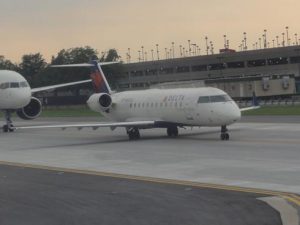
Furthermore, Delta plans to operate these routes using smaller aircraft, including Boeing 717’s and Embraer RJ’s, adding a maximum of approximately 1,876 seats departing Love Field each day, much less than Southwest could offer.
The DOJ recently reaffirmed its position that it intends to award the two gates only to low-cost carriers, or LCC’s, claiming that it doesn’t view Delta as an “appropriate divestiture candidate” for the slots due to its position as a legacy carrier. Even so, Delta remains vigilant, having already sold tickets on flights out of these gates, in its attempts at procuring the two openings. The DOJ’s statement also leaves Virgin America, realistically Southwest’s most armed competitor, in the mix.
Virgin America’s seat offerings–about 2,628 per day, using Airbus A320’s–more closely parallel those of Southwest. However, like Delta, it would only offer service to a few select destinations, mainly its current hubs: New York, Washington D.C., Los Angeles, San Francisco, and Chicago. Virgin also couldn’t boast allowing customers access to a world-class network, as it serves far less cities than Delta and Southwest overall. And, without adding more than a handful of direct flights, the ability to at least access other cities via a connection represents a significant factor that Virgin America lacks.
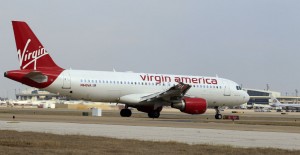
Like Delta, Virgin America could simply choose to expand its operations at DFW, where both currently fly to. With the AA/US merger, American will likely abandon US Airways’ gates in Terminal E, since maintaining them would pose a logistical burden for them, having to shuttle bags across the airport for connecting passengers, and having to hire additional staff for the purpose of manning only a few more gates. This opens the door for airlines like Virgin America to add additional flights from DFW in the near future. Especially considering that both Delta and Virgin America already operate from Terminal E, each would be in a prime position to capitalize on the availability of extra gates there. But, even more damning, Virgin America claims it would vacate DFW it if received the gates at Love Field, meaning instead of offering Dallas travelers more options or more flights, it would simply shift where its current flights are located. Dallas passengers stand to gain little from this or from Delta, both of which could easily match their plans by ramping service from DFW.
Southwest, by contrast, does not possess the same freedom to expand its operations at either Love Field or DFW. In addition to the twenty gate limit at Love Field, Southwest, while technically able to expand at nearby DFW, would need to forfeit a gate at Love Field for every one it obtained if it decided to build a presence there, its only other avenue to expand. This represents a seismic advantage for both Delta and Virgin America.
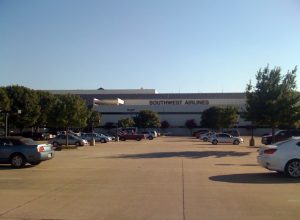
One should also not hastily dismiss Southwest’s storied legacy in the Dallas metroplex. Headquartered in Dallas since its creation in the 1970’s, Southwest has demonstrated a commitment to the city that should be rewarded. Following the construction of DFW Airport, Southwest practically self-supported Love Field as all other airlines fled for DFW, a level of commitment the City of Dallas, the owner of the gates, would likely recognize.
Awarding the gates to Delta, which, as recently as 2005, drastically scaled back what was a sizable DFW hub, or Virgin, which only began offering service to the area this decade, would discourage Southwest’s steadfast commitment to the area. While consumers know that Southwest would use the gates to serve the metroplex, what would prevent, say, Delta, from abandoning these gates again down the road, as it demonstrated a tendency to do in the face of competing with American?
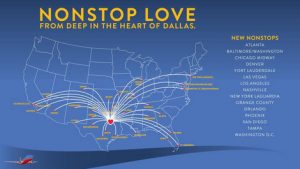
Proponents of awarding the gates to Delta or Virgin America would argue that adding another airline to Love Field would increase the competitive environment there, and that awarding them to Southwest creates a monopoly. This, however, operates off the assumption that Love Field and DFW attract different passenger audiences and serve different markets. In reality, passengers–especially the majority of price-conscious passengers–would not be more inclined to fly Delta or Virgin America simply for the benefit of avoiding the drive to DFW. Arguing otherwise overstates the advantage of shedding a matter of minutes off the drive to the airport, especially when the price of airfare, at least hundreds of dollars, would serve as a more important factor in one’s decision. Virgin America and Delta essentially already compete with Southwest, negating the need to place them at the same airport to induce competition and bypass monopolistic behavior. Most that already fly Virgin America or Delta would continue to do so whether they remained at DFW or relocated to Love Field. And, as previously stated, the non-stop flights offered by Southwest could serve as the sharpest sword in the battle for business travelers, even while these fliers are generally less price-conscious.
The DOJ should ultimately award the two gates at Love Field to Southwest Airlines. Because the City of Dallas initially selects the recipient of the gates, it appears that Southwest has a strong chance of winning these openings due to its history at Love Field. Furthermore, the DOJ’s insistence that the gates go to a low-cost carrier, which Southwest is generally considered, indicates it would probably approve Southwest if the city decided in this manner. That said, the city may opt to offer them to Virgin America to avoid what it may believe to be a monopoly brewing at the airport. To ensure the most equitable outcome, Southwest must continue to augment its already peppered plate of non-stop flights so that it can not be ignored by the DOJ or the City of Dallas.
The DOJ initially mandated the divestiture of the Love Field gates to ensure adequate post-merger competition in the area; keeping this in mind, Southwest is clearly best suited to spar head-to-head with American.




